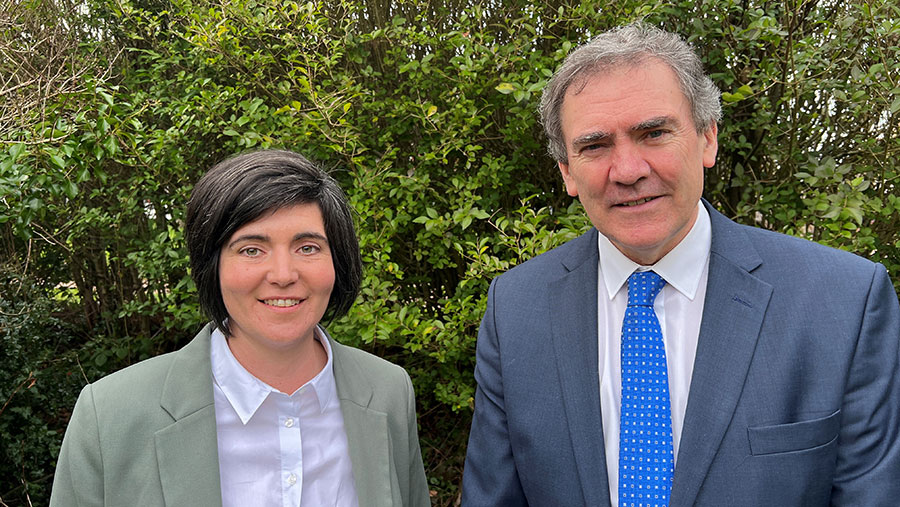NFU Cymru leaders threaten to shun Sustainable Farming Scheme
 NFU Cymru deputy president Abi Reader and president Aled Jones © NFU Cymru
NFU Cymru deputy president Abi Reader and president Aled Jones © NFU Cymru Farmer support for Wales’ new agricultural support scheme has been dealt a significant blow after NFU Cymru’s president and his deputy said they would not be opting in because its compulsory 10% tree cover requirement would financially harm their farming businesses.
Speaking at the Royal Welsh Showground in Llanelwedd ahead of the event’s opening day on Monday (24 July), Aled Jones and Abi Reader suggested their standpoint on the Welsh government’s Sustainable Farming Scheme (SFS) reflected the position of many other farmers in different sectors.
See also: Farmer dismay as Welsh government sticks to 10% tree plan
Their decision comes after the government announced in July that it was doubling down on its proposal for mandatory 10% tree cover and 10% habitat cover as requirements for SFS payments, despite earlier warnings from farming unions that it would prevent many farmers from joining.
Unviable
Mr Jones, who produces milk from a herd of pedigree Holsteins near Caernarfon, and third-generation farmer Ms Reader, who has a 210-cow herd, are adamant that it won’t work for their businesses, nor for many others’.
“We could identify some areas for tree planting but I doubt I can get to 10% so I will be barred from the scheme,” said Mr Jones, who currently has 5-6% tree cover.
“With pressures to maximise land area to meet the nitrogen limit requirements of the Control of Agricultural Pollution Regulations, I simply do not have the additional land to spare for 10% tree cover.”
He called on rural affairs minister Lesley Griffiths to “seriously consider if this approach is the right approach”.
‘Disappointed’
In response, the minister told a press briefing at the showground that she was “extremely disappointed” by what she admitted had been an “unexpected” announcement by the two leading figures in NFU Cymru, suggesting it had been premature.
“We haven’t got to a final design of the scheme yet,” she said. “The final consultation will be at the end of this year.”
Ms Griffiths acknowledged that some farms won’t be able to meet the 10% target and that discussions would continue to work out how they could be part of the scheme.
“At the moment we are saying that 10% is our target, but it depends on how many people say they don’t want to be part of it.”
But the minister was firm on her aspiration too: “We are in very tight budget times and in a climate emergency; we have to do things differently.”
Budget
The government has yet to publish SFS payment rates – though Ms Griffiths suggested the budget in 2025 when the SFS kicks in is likely to be similar to 2023 levels.
NFU Cymru doesn’t expect payments to reflect the reduction in land values associated with tree planting, which a representative of a major bank in Wales has calculated to be equivalent to an 80% devaluation because it is a permanent land change.
Ms Reader said she would need to double tree cover on her 284ha farm in South Wales from the current 5% to achieve the target.
That would involve taking 14ha, “at least three of my fields”, out of production and losing 30 cows from her herd.
“It would also mean the loss of half a full-time member of staff,” she said. “When we do the budget it just doesn’t stack up.”
Her business will, however, feel the financial pinch of losing the Basic Payment Scheme (BPS), without government funding from a successor scheme.
Although Ms Reader recognised there was more Welsh farmers could do to help the country achieve net-zero targets, she warned that tree planting “cannot eclipse everything else”.
Unless the government was prepared to reconsider its proposals around tree and habitat cover, she believed that a significant proportion of farmers and large swathes of the countryside would be excluded from the SFS.
